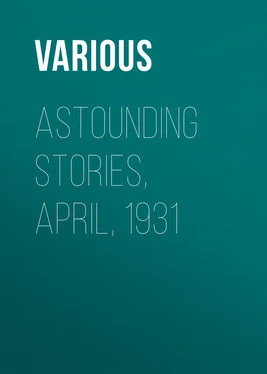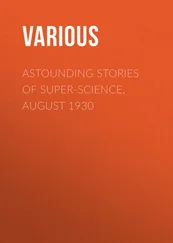Various - Astounding Stories, April, 1931
Здесь есть возможность читать онлайн «Various - Astounding Stories, April, 1931» — ознакомительный отрывок электронной книги совершенно бесплатно, а после прочтения отрывка купить полную версию. В некоторых случаях можно слушать аудио, скачать через торрент в формате fb2 и присутствует краткое содержание. Жанр: periodic, foreign_edu, на английском языке. Описание произведения, (предисловие) а так же отзывы посетителей доступны на портале библиотеки ЛибКат.
- Название:Astounding Stories, April, 1931
- Автор:
- Жанр:
- Год:неизвестен
- ISBN:нет данных
- Рейтинг книги:5 / 5. Голосов: 1
-
Избранное:Добавить в избранное
- Отзывы:
-
Ваша оценка:
- 100
- 1
- 2
- 3
- 4
- 5
Astounding Stories, April, 1931: краткое содержание, описание и аннотация
Предлагаем к чтению аннотацию, описание, краткое содержание или предисловие (зависит от того, что написал сам автор книги «Astounding Stories, April, 1931»). Если вы не нашли необходимую информацию о книге — напишите в комментариях, мы постараемся отыскать её.
Astounding Stories, April, 1931 — читать онлайн ознакомительный отрывок
Ниже представлен текст книги, разбитый по страницам. Система сохранения места последней прочитанной страницы, позволяет с удобством читать онлайн бесплатно книгу «Astounding Stories, April, 1931», без необходимости каждый раз заново искать на чём Вы остановились. Поставьте закладку, и сможете в любой момент перейти на страницу, на которой закончили чтение.
Интервал:
Закладка:
Various
Astounding Stories, April, 1931
Monsters of Mars
A COMPLETE NOVELETTE
Allan Randall stared at the man before him. "And that's why you sent for me, Milton?" he finally asked.
There was a moment's silence, in which Randall's eyes moved as though uncomprehendingly from the face of Milton to those of the two men beside him. The four sat together at the end of a roughly furnished and electric-lit living-room, and in that momentary silence there came in to them from the outside night the distant pounding of the Atlantic upon the beach. It was Randall who first spoke again.
Three Martian-duped Earth-men swing open the gates of space that for so long had barred the greedy hordes of the Red Planet.
The other's face was unsmiling. "That's why I sent for you, Allan," he said quietly. "To go to Mars with us to-night!"
"To Mars!" he repeated. "Have you gone crazy, Milton – or is this some joke you've put up with Lanier and Nelson here?"
Milton shook his head gravely. "It is not a joke, Allan. Lanier and I are actually going to flash out over the gulf to the planet Mars to-night. Nelson must stay here, and since we wanted three to go I wired you as the most likely of my friends to make the venture."
"But good God!" Randall exploded, rising. "You, Milton, as a physicist ought to know better. Space-ships and projectiles and all that are but fictionists' dreams."
"We are not going in either space-ship or projectile," said Milton calmly. And then as he saw his friend's bewilderment he rose and led the way to a door at the room's end, the other three following him into the room beyond.
It was a long laboratory of unusual size in which Randall found himself, one in which every variety of physical and electrical apparatus seemed represented. Three huge dynamo-motor arrangements took up the room's far end, and from them a tangle of wiring led through square black condensers and transformers to a battery of great tubes. Most remarkable, though, was the object at the room's center.
It was like a great double cube of dull metal, being in effect two metal cubes each twelve feet square, supported a few feet above the floor by insulated standards. One side of each cube was open, exposing the hollow interiors of the two cubical chambers. Other wiring led from the big electronic tubes and from the dynamos to the sides of the two cubes.
The four men gazed at the enigmatic thing for a time in silence. Milton's strong, capable face showed only in its steady eyes what feelings were his, but Lanier's younger countenance was alight with excitement; and so too to some degree was that of Nelson. Randall simply stared at the thing, until Milton nodded toward it.
"That," he said, "is what will flash us out to Mars to-night."
Randall could only turn his stare upon the other, and Lanier chuckled. "Can't take it in yet, Randall? Well, neither could I when the idea was first sprung on us."
Milton nodded to seats behind them, and as the half-dazed Randall sank into one the physicist faced him earnestly.
"Randall, there isn't much time now, but I am going to tell you what I have been doing in the last two years on this God-forsaken Maine coast. I have been for those two years in unbroken communication by radio with beings on the planet Mars!
"It was when I still held my physics professorship back at the university that I got first onto the track of the thing. I was studying the variation of static vibrations, and in so doing caught steady signals – not static – at an unprecedentedly high wave-length. They were dots and dashes of varying length in an entirely unintelligible code, the same arrangement of them being sent out apparently every few hours.
"I began to study them and soon ascertained that they could be sent out by no station on earth. The signals seemed to be growing louder each day, and it suddenly occurred to me that Mars was approaching opposition with earth! I was startled, and kept careful watch. On the day that Mars was closest the earth the signals were loudest. Thereafter, as the red planet receded, they grew weaker. The signals were from some being or beings on Mars!
"At first I was going to give the news to the world, but saw in time that I could not. There was not sufficient proof, and a premature statement would only wreck my own scientific reputation. So I decided to study the signals farther until I had irrefutable proof, and to answer them if possible. I came up here and had this place built, and the aerial towers and other equipment I wanted set up. Lanier and Nelson came with me from the university, and we began our work.
"Our chief object was to answer those signals, but it proved heartbreaking work at first. We could not produce a radio wave of great enough length to pierce out through earth's insulating layer and across the gulf to Mars. We used all the power of our great windmill-dynamo hook-ups, but for long could not make it. Every few hours like clockwork the Martian signals came through. Then at last we heard them repeating one of our own signals. We had been heard!
"For a time we hardly left our instruments. We began the slow and almost impossible work of establishing intelligent communication with the Martians. It was with numbers we began. Earth is the third planet from the sun and Mars the fourth, so three represented earth and four stood for Mars. Slowly we felt our way to an exchange of ideas, and within months were in steady and intelligent communication with them.
"They asked us first concerning earth, its climates and seas and continents, and concerning ourselves, our races and mechanisms and weapons. Much information we flashed out to them, the language of our communication being English, the elements, of which they had learned, with a mixture of numbers and symbolical dot-dash signals.
"We were as eager to learn about them. They were somewhat reticent, we found, concerning their planet and themselves. They admitted that their world was a dying one and that their great canals were to make life possible on it, and also admitted that they were different in bodily form from ourselves.
"They told us finally that communication like this was too ineffective to give us a clear picture of their world, or vice versa. If we could visit Mars, and then they visit earth, both worlds would benefit by the knowledge of the other. It seemed impossible to me, though I was eager enough for it. But the Martians said that while spaceships and the like were impossible, there was a way by which living beings could flash from earth to Mars and back by radio waves, even as our signals flashed!"
Randall broke in in amazement. "By radio!" he exclaimed, and Milton nodded.
"Yes, so they said, nor did the idea of sending matter by radio seem too insane, after all. We send sound, music by radio waves across half the world from our broadcasting stations. We send light, pictures, across the world from our television stations. We do that by changing the wave length of the light-vibrations to make them radio vibrations, flashing them out thus over the world, to receivers which alter their wave-lengths again and change them back into light-vibrations.
"Why then could not matter be sent in the same way? Matter, it has been long believed, is but another vibration of the ether, like light and radiant heat and radio vibrations and the like, having a lower wave-length than any of the others. Suppose we take matter and by applying electrical force to it change its wave-length, step it up to the wave-length of radio vibrations? Then those vibrations can be flashed forth from the sending station to a special receiver that will step them down again from radio vibrations to matter vibrations. Thus matter, living or non-living, could be flashed tremendous distances in a second!
Читать дальшеИнтервал:
Закладка:
Похожие книги на «Astounding Stories, April, 1931»
Представляем Вашему вниманию похожие книги на «Astounding Stories, April, 1931» списком для выбора. Мы отобрали схожую по названию и смыслу литературу в надежде предоставить читателям больше вариантов отыскать новые, интересные, ещё непрочитанные произведения.
Обсуждение, отзывы о книге «Astounding Stories, April, 1931» и просто собственные мнения читателей. Оставьте ваши комментарии, напишите, что Вы думаете о произведении, его смысле или главных героях. Укажите что конкретно понравилось, а что нет, и почему Вы так считаете.












